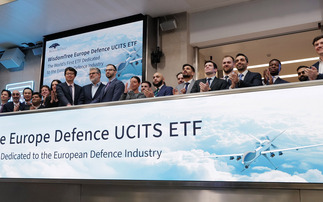Right now passive investing is on everyone's lips. Tracker funds and ETFs are now commonplace in many wealth managers' portfolios. Lyxor ETF asks why managers are using passive investments, and how you can start adding passive to your portfolio.
More and more ETFs are seen as a portfolio staple for wealth managers. Their importance is evident from the rapid growth the industry - 2017 is set to be a record year with ETF inflows already surpassing those of 2016.
But before you start thinking that this is another one of those Active vs. Passive debates, it's not. The argument over market efficiency and manager performance is well aired and we are not here to go over old ground. Rather we want to ask how we got here and what the passive boom means for your portfolios.
Professional investors believe ETF growth isn't stopping
Source: The EDHEC European ETF and Smart Beta Survey 2016
Huge growth... wide choice
One of the main appeals of ETF investing is access. There is a wide choice of ETFs available, making it simple to create a diversified portfolio whether you want equity or fixed income, a major index or niche sector.
ETFs are no longer restricted to major indices, many are now available which target investor objectives. For example, there are a host of equity income options available concentrating on quality dividends. For inflation protection you can find low cost index linked bonds, or minimum variance ETFs for reducing risk.
>>ETF Flows: Find out which markets and strategies investors are buying
Low cost
The squeeze on cost is adding more pressure on wealth managers to find low annual fee funds. One of the most attractive features of ETFs has to be their low costs; price competition hasn't let up. At Lyxor, we have been cutting charges throughout the year, most recently we reduced the TER on three European ETFs to just 0.07%.
Simplicity is another main attraction for passive investments. They are transparent, with index data and holdings disclosed daily online - easier to follow an index than many active funds. ETFs are traded like a share throughout the day - more convenient than the old fashioned daily valuation points of traditional funds.
Choosing in 3 steps
If you are hoping to add an ETF or index tracker fund to you a portfolio, there are a lot of options. Here are three questions to help you take the first steps with finding the right investment.
- Look at the index
The starting point for any passive investment is to choose the right index. After all, this is the biggest determinant of investment performance. Find out what the index covers - shares or bonds, foreign or local? Look at its composition; does it fit with your asset allocation strategy? How is the index weighted?
- Find the most efficient option
When you're happy with the index, what is the most efficient way to track it? Look beyond the TER, but also look at the cost of trading and how precisely your investment tracks the index. We created the Lyxor ETF Efficiency Indicator to help investors measure this. We look at three elements: performance, precision and ease of trading. You can see the full report, comparing the largest ETFs available here on the Lyxor ETF website.
- Choose the provider
There are many ETF providers that offer very similar products but with varying fees and fund structures. Some providers specialise in certain markets whereas others offer a broad coverage of asset classes. Consider an ETF provider that is accomplished, with a track record of managing a passive fund. Service is important and you need to know the manager is dependable.
Find out how Lyxor ETF is modernising its ETF range
These questions should be your starting point, though of course there are many other factors to consider. We will be looking at other elements of passive selection in future blogs. Next week: Are passive funds always a vehicle for growth?
For more information on Lyxor ETF, including their latest ETF Efficiency Report visit LyxorETF.co.uk
This communication is for professional clients only.
Source for fee data: Lyxor ETF, correct as at 1st September 2017
This document is for the exclusive use of investors acting on their own account and categorised either as "Eligible Counterparties" or "Professional Clients" within the meaning of Markets In Financial Instruments Directive 2004/39/EC.
This document is of a commercial nature and not of a regulatory nature. This document does not constitute an offer, or an invitation to make an offer, from Société Générale, Lyxor International Asset Management or any of their respective affiliates or subsidiaries to purchase or sell the product referred to herein.
We recommend to investors who wish to obtain further information on their tax status that they seek assistance from their tax advisor. The attention of the investor is drawn to the fact that the net asset value stated in this document (as the case may be) cannot be used as a basis for subscriptions and/or redemptions. The market information displayed in this document is based on data at a given moment and may change from time to time. The figures relating to past performances refer or relate to past periods and are not a reliable indicator of future results. This also applies to historical market data. The potential return may be reduced by the effect of commissions, fees, taxes or other charges borne by the investor.
Lyxor International Asset Management (Lyxor ETF), société par actions simplifiée having its registered office at Tours Société Générale, 17 cours Valmy, 92800 Puteaux (France), 418 862 215 RCS Nanterre, is authorized and regulated by the Autorité des Marchés Financiers (AMF) under the UCITS Directive and the AIFM Directive (2011/31/EU). Lyxor ETF is represented in the UK by Lyxor Asset Management UK LLP, which is authorised and regulated by the Financial Conduct Authority in the UK under Registration Number 435658













